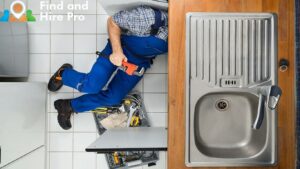There are several strategies to safeguard your house. Some are apparent, like maintaining your siding and paint in good shape and keeping your roof in good repair. Some are more subtle. Have you recently given thought to having your home’s plumbing inspected, for instance? A thorough plumbing inspection report can assist you in identifying minor issues before they develop into larger ones, thus saving you money and aggravation.
How To Find A Plumber Near Me?
Your home’s plumbing system is intricate. You run the danger of not having access to clean water or suffering from water damage if it is not functioning properly. It’s crucial to have a professional plumber on call. So let’s discuss where to look for one and what to ask when you do.

Be Proactive
Don’t put off looking for a plumber until there’s a problem. There’s a significant probability that if you need a plumber right away, your search may change from the best plumber around to ‘whoever can show up first’. You may start your search for a plumber on your terms and take the time to discover someone knowledgeable and reasonably priced if you prepare yourself for the eventuality that you’ll need one.
Appointments Made On Short Notice And A One-Stop Service
When you choose a local plumber, he can frequently arrive immediately and provide you with a comprehensive service, including problem diagnosis, material procurement, and project completion.
Warranty
An honest plumber will stand behind the job they have done. The manufacturer warranty on every product they install should be understood by your plumber, and they should support it with a separate labor warranty. Each project’s craftsmanship warranty will be different.
Check Website And Online Business Directory For Reputation
Try looking in local business directories and review websites if you haven’t been successful in finding a reliable plumber in your neighborhood through referrals. If you’re looking for a plumber who isn’t personally suggested, be careful to study reviews and ratings to determine the caliber of the services they offer. Make sure reviews aren’t anonymous and have been verified to avoid Cowboys.
Licensed Plumber
A qualified plumber may have a license for both commercial and domestic work, or they may have a dual license that covers both.
Ratings And Certificates
When employing a plumber, you should find out whether they have a plumber’s insurance, rating, and/or certification. License-holding plumbers imply that they are the most knowledgeable about the plumbing business.
Evaluate Plumbing Services
A professional plumbing inspection will examine the home’s supply lines, drains, and water filtration system in greater detail and for a longer period than a home plumbing examination. A few expert plumbing inspections attest to the fact that everything is now in compliance with the most recent building requirements.
Turn Off The Primary Water Supply
Check the shut-off valve for the main water supply for any potential flaws or damages. Look for leaks in the main water line and the water meter.
Verify The Plumbing Fixtures
Leaks drip, and blockages should be looked for in every plumbing fixture. The inspector should also search for any corrosion indicators.
Check The Drains And Sewers
It is important to inspect all drains for leaks, clogs, and blockages. A root incursion should be looked for by the inspector as well.
Water Heater Inspection
It is important to cleanse the water heater and look for any damage or leaks. Corrosion on the anode rod should also be inspected.
Test The Water Pressure In The Piping
The inspector changes the pressure from 75 psi to 100 psi to test the usual functioning water pressure. The water supply is next tested to see if it is flowing freely and at the required minimum water pressure.
Check The Valves, Supply Lines, And Fittings
Check for leaks, drips, and obstructions in all plumbing fixtures, supply lines, and valves. Corrosion indicators should also be looked for by the inspector.
Verify The Drainage And Sewage Lines
Together with the plumbing system, the sewage and drainage lines are carefully inspected for any damage, corrosion, blockages, or leaks.
Check The Drains, Supply Lines, And Fixtures
The inspector scans the area for any indications of water damage both inside and outside. It is advised that every fixture has its valve so that it may independently manage its water supply.
Write Reports And Take Pictures
Take pictures of all the plumbing issues and damage you notice. Finally, list every plumbing issue you discover in a report.
A plumbing inspection report will be produced by the inspector following the completion of the plumbing examination. All inspection results will be included in this report, along with any repairs or replacements that might be suggested. All pertinent parties should be given a copy of the plumbing inspection report so that any issues may be fixed.
Conclusion
A plumbing inspection is an inexpensive approach to save significant costs down the road if you even suspect that your property may have any plumbing problems or if you’re considering buying a home and want to ensure everything is in working order. You’ll have a better sense of the potential repair expenses if you inspect everything related to the sewage line and plumbing system. Also, hiring a professional to perform a plumbing examination is far preferable to doing it yourself.
